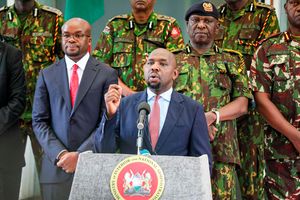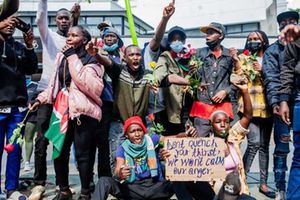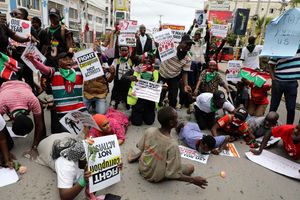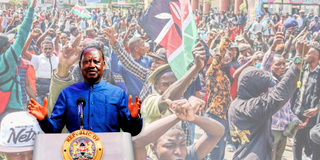
Veteran politician Raila Odinga has once again called for a national dialogue in Kenya to address current political standoffs and governance issues.
Veteran politician Raila Odinga’s latest call for a national dialogue to resolve the current political standoff triggered by poor governance has once again cast a spotlight on the country’s unending talks for reforms.
For decades, successive regimes have resorted to the formation of various dialogue teams to come up with sweeping reform proposals.
But some of the dialogues have ended up gobbling taxpayers' millions of shillings, with those in power deliberately frustrating their implementation. Other reform proposals have also ended up being halted by the courts for being unconstitutional, while others have been credited for major electoral reforms in the country.
The National Dialogue Committee (NADCO) report remains largely unimplemented, despite proposing reforms that sought to address some of the issues Gen Zs have been pushing for since June 2024. Only the Independent Electoral and Boundaries Commission (IEBC) Bill, 2024, has been implemented.
Failed promises and billions burnt
The NADCO report was a product of a bipartisan consensus between President Ruto and Mr Odinga following sustained anti-government protests.
In the run-up to the 2022 elections, Mr Odinga and then President Uhuru Kenyatta initiated yet another national conversation under the banner of the Building Bridges Initiative (BBI).
The talks team went around the country to collect views, burning billions of shillings, before coming up with sweeping reform proposals designed to alter the structure of the country’s governance as well as address the divisive politics by creating additional positions to the ruling class.
The duo's quest, however, suffered a major setback when the Supreme Court finally put the brakes on the ex-president's bid to make sweeping constitutional changes through the initiative.
Other past dialogue teams in the country include the Truth, Justice and Reconciliation Commission (TJRC), the Commission of Inquiry on Post-Election Violence (CIPEV), the Constitution of Kenya Review Commission (CKRC) and the National Dialogue and Reconciliation Process (Agenda 4).
And now with President Ruto facing a major revolt by the youth, Mr Odinga has once again called for yet another national dialogue.
“I propose an inclusive intergenerational national conclave to hear our people across all divides and come up with the irreducible reforms and changes necessary to take the country forward. I propose that the country urgently returns to the agenda of comprehensive police reforms, focusing on enhancing accountability, transparency and improving police to people relations,” said Mr Odinga on Monday.
“I propose that the conclave envisage comes up with better and sustainable ways for addressing Transparency, Accountability, and Impunity especially with regard to corruption and ensuring that leaders are held accountable for their actions,” he proposed.
Deputy President Kithure Kindiki, while speaking on Monday in Lamu, also called on the protesting youth to embrace dialogue in addressing their concerns.
“Our countrymen, I’m asking you that we find ways to talk and dialogue, we cannot build the country through chaos. I plead with you, my fellow countrymen, we cannot take our country forward through chaos and incitement. We must learn to solve our problems through consultations and peaceful ways,” Prof Kindiki said.
The proposal for yet another national dialogue has since triggered a heated debate, with pro-government leaders backing it while those in the opposition have labelled it another talk show to hoodwink Kenyans.
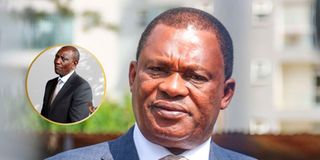
Public Service Cabinet Secretary Justin Muturi. Inset is President William Ruto.
Former Attorney General Justin Muturi, who has become a fierce critic of President Ruto, described the proposal as a red herring. He said several similar reports have not borne any fruit.
He cited the recent Memorandum of Understanding (MoU) between President Ruto’s United Democratic Alliance and Mr Odinga’s Orange Democratic Movement (ODM) as another failed attempt to address the same issues, including abductions, extrajudicial killings, corruption, as well as wastage of public resources.
“One can even equate the so-called 'ten points' agreement between UDA and ODM to such past efforts. That too has not been implemented yet Raila is not even complaining about its non-implementation,” said Mr Muturi.
“How does he expect Ruto to implement the results of such a conclave? I have said severally that Ruto considers even the Constitution not only an aberration but a nuisance to his way of doing things and ambition to the imperial presidency which he so desperately needs,” he said.
Dr Ruto and his advisors are facing a different kind of adversary in the youth-led opposition, one that requires a change in tack to handle.
The Gen Zs, as the youngest among the pro-reforms young Kenyans are referred to, showed their force in June while marking the first anniversary of protests that were originally against the Finance Bill 2024, but later spread to include more demands for change to enhance governance.
There is also grave concern about where and when Gen Z will stop. The youths have made it clear that they won’t stop until the president leaves office. There are fears by those in power that ceding so much ground would be like feeding a monster that would continue to attack them.
Machakos Deputy Governor Francis Mwangangi – an ally of Wiper leader Kalonzo Musyoka – said the talks are the only way out of the current political standoff. He, however, said that the dialogue would only be meaningful if led by the church, with commitment from the President to have the proposal implemented.
“We obviously need a national dialogue. It is the only way out because it appears everyone has a problem on how this country is being run,” said Mr Mwangangi.
He said, “The only problem people are having is a lack of commitment to implement such reports. The fear is that people would talk for a year, then nothing happens. The President held talks with Gen Z on the X space; what did he do after listening to their demands?
Uriri MP Mark Nyamita, a member of Mr Odinga’s ODM party, said talks have in the past resulted in major reforms, including the 2010 constitution.
Mr Nyamita cited the Inter-Parties Parliamentary Group (IPPG) formed in the run-up to the 1997 general election, which was credited for free and fair elections, especially in 2002.
The IPPG was a coalition of political parties and parliamentarians formed to facilitate political reform and ensure free and fair elections.
“Kenyans should never get tired of dialogue, it is the only way we will learn to live with each other. It's about time the different groups bring their issues to the table,” said Mr Nyamita.
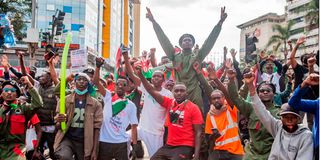
Protesters picket along Kenyatta Avenue in Nairobi on June 25, 2025 during the commemoration of the 2024 Gen-Z protests.
Gen Z's new demands
Prof David Monda, a US-based university lecturer and a political analyst, said the Gen Z demands do not require dialogue since they are clear.
“This proposal for dialogue is a well-tested political merry-go-round structured to give power brokers in the broad based government time to diffuse public anger.”
“I think it's a cheeky ploy on the part of the ODM leader to lower the political temperature over the unmet Gen Z demands like halting extrajudicial killings, abductions, transparency and good governance,” said Prof Monda.
He said the calls for talks could be another ploy by Mr Odinga to reinsert himself into opposition politics as a reformist rather than the conformist he has become.
“His acceptance to join the Ruto government lost him a lot of political support and legitimacy. He is fast becoming yesterday's man. A relic of a bygone political era. A politician unable or unwilling to deal frontally and conclusively with Gen Z demands and the public anger at his support for the Ruto administration,” he noted.
Similar opposition also came from Makueni Senator Dan Maanzo.
“As much as you want to have a discussion under a conclave, which would end up in a referendum and constitutional amendment, I don’t think we will have addressed the issues. The problems are more political,” said Mr Maanzo.
The TJRC, for example, was established to investigate human rights violations and other historical injustices that occurred between independence in 1963 and 2008, following the 2007-08 post-election violence that claimed more than 1,300 lives and displaced over 600,000 people.
The Commission's mandate included investigating gross human rights violations, economic crimes, illegal acquisition of public land and other forms of historical injustice.
The Commission of Inquiry on Post-Election Violence (CIPEV), also known as the Waki Commission, was also established in Kenya to investigate the causes and effects of the violence that erupted after the disputed 2007 presidential election.
The Commission was chaired by Justice Philip Waki and was mandated to investigate the facts and circumstances surrounding the violence, identify the roles played by state security agencies and other actors, and recommend measures to prevent future occurrences of such violence.
The Waki Commission's final report, published in October 2008, provided a detailed account of the violence, identified key perpetrators and recommended significant reforms to Kenya's electoral, judicial and security systems.
One of the key recommendations was the establishment of a special tribunal to try those responsible for the violence; failing which, cases should be referred to the International Criminal Court (ICC).


